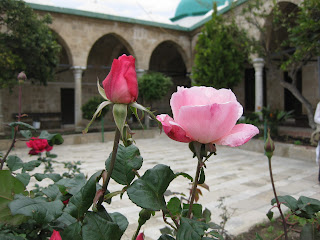As accompaniers we often go out for a stroll in Tulkarm wearing our EAPPI vests. Because we are quite recognizable, children will often come up to me and ask: “What’s your name?” When I tell them “my name is Susanne” they recognize that and say, “Ah, Susanne, you are welcome.” Apparently Susanne is a common Arabic name and I am appreciative while living here that my parents gave me this name. I was told as a small child that my name means lily.
After spending time in this area of the world, I find that my name is especially interesting.
After spending time in this area of the world, I find that my name is especially interesting.
Susan is a feminine given name, a form of Susanna, deriving originally from Middle Egyptian "sšn" (lotus flower), first reported on an 11th Dynasty sarcophagus dating from approximately 2000 B.C. However, the Hebrew root for the name for the lily, שושן is derived from the root שוש or ששנ , meaning "to be joyful, bright, or cheerful", which is the basis for the word and name ששון Sasson, meaning "joy of life". The Persian name for lily is سوسن sausan. The name of Susa, an ancient city of Persia
The EAPPI organization rents the flat we live in Tulkarm. Our landlady’s first name is Susu which I understand is also a derivative of Susanne. A contact person in a nearby village is also named Suzanne so I feel in good company with my name. We are taking Arabic lessons from a neighbor and she has a 1 year old daughter named Noor. Her name means “light” and this precious little being is a true ray of light.
A local Christian businessman’s first name is Daoud which is a version of David. The Christian owner of a coffeeshop whose name is Samir has been very gracious to us throughout our stay. His name means “a pleasant companion” and he represents his name well by being a genuine friend to everyone he meets. His sister’s name is Mouna and her name means “wish.”
In our conversation classes we always introduce ourselves and then invite other members of the group to introduce themselves. I have found it very helpful to remember people by their names and actually write their names down for future reference.
In our conversation classes we always introduce ourselves and then invite other members of the group to introduce themselves. I have found it very helpful to remember people by their names and actually write their names down for future reference.
 |
| Women's Conversation Group in Tulkarm Refugee Camp |
Nearly everyone I have been in conversation with knows the meaning of their name. That also is another way for me to connect and remember them. I think it's wonderful that Palestinians choose the names for their children with great care and that children are very aware of its meaning.
Susanne





















